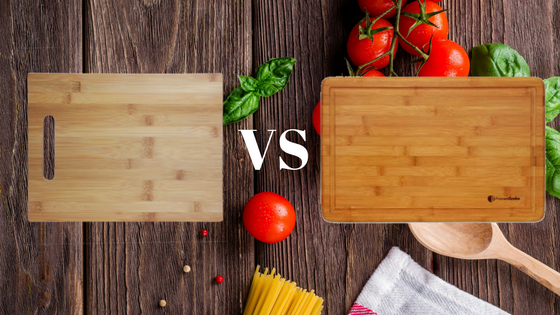
Generally the size and shape of the board isnt a significant factor as people can determine them depending on their needs. Overall bamboo is a solid option and a popular cutting board type.
On the other hand picking the material of the board is crucial.
Bamboo vs wood chopping board. Bamboo is also a renewable resource and a lot of environmentalists often use it. They claim that bamboo cutting boards absorb less liquid than hardwood ones. However theres an everlasting debate on this topic that were not going to get into.
A pro for bamboo boards is that it does not need chemicals to thrive or be harvested. The main difference between bamboo and wood cutting boards is what is known as porosity. Bamboo is considered a grass and is slightly more porous making it harder to clean yet stronger than a wood cutting board.
Prepping food in your kitchen without a cutting board and a knife can be virtually impossible. Bamboo is a light but solid wood that engulf little moisture and gain stay swelling and warping. They are alternatives to plastic and glass cutting boards.
When harvesting is taking place bamboo is chosen carefully for maturation size and markings. While wooden cooking utensils like cooking spoons and spatulas are made from 1 solid piece of wood except most cutting boards the majority of bamboo kitchenware isnt made from 1 piece but from multiple bamboo strips. Bamboo stems are cut into pieces carbonised and then glued together.
This process takes a lot of energy heat and synthetic glue. Uulki chopping boards are made from. Now before you go throwing all your plastic or bamboo cutting boards away well talk about bamboo in a minute lets discuss.
Plastic will work for some things. I would definitely transition to wood but if you have a newer plastic cutting board its not worthless. Bamboo is a low maintenance wood.
Having a dense wood is important as it keeps out water where bacteria can grow and live. However even with high-quality wood cutting boards usually require regular maintenance with mineral oil. It will help you to keep cutting board.
Bamboo is somewhat porous but is harder than wood. It also requires oiling because the bamboo can splinter when not cared for properly. Long-time use also makes the bamboo boards more receptive to bacteria.
Moreover bamboo cutting boards are tougher and much less porous than hardwood cutting boards. Wooden Cutting Board Materials. There are a few common wood types used for cutting boards.
The best woods are hardwoods like walnut or teak as softer woods. Wood is ideal for cutting boards because it is antibacterial and resistant. Since wood is a natural product it has different properties which are sometimes better and sometimes worse for cutting boards.
In this article I explain which types of wood are particularly suitable for cutting boards the differences betwee. Wooden chopping boards - the safest easiest and best option for your kitchen. With self-healing and antibacterial properties wooden chopping boards are the board of choice.
They are practical durable and look great too and are the ideal surface from which to prepare delicious home cooked meals. So if you are looking for a chopping board that is clean hygienic and long-lasting shop our. Bamboo the new kid on the block is as durable as wood and has environmental advantages over either wood or plastic.
It is 16 harder than maple but its not wood at all. Bamboo resists retaining water and as a result will not warp or crack as easily as normal wood. That said its not recommended to put a bamboo board let alone any cutting board in a dishwasher due to the extreme heat.
Only thicker plastic cutting boards are considered safe for dishwashers since they generally wont crack or warp. Wood vs bamboo cutting boards plastic cutting boards vs glass cutting boards the board size and style to pick are the common questions that people ask. Generally the size and shape of the board isnt a significant factor as people can determine them depending on their needs.
On the other hand picking the material of the board is crucial. A cutting board made of good material can not only. Bamboo Cutting Boards – Great Bamboo considered a grass and not a wood makes a terrific cutting board.
The fact that its so fast-growing makes it a renewable resource and a great choice for the eco-conscious. Bamboo acts similar to wood – its still somewhat porous but is considered harder than wood. On the Janka scale an industry-wide standard that measures the hardness of wood bamboo is 1380 while walnut is 1010 and maple is 1450 The natural density of bamboo produces a cutting board thats highly resistant to scarring and absorbing liquid which means its less likely to.
Applauded for its sustainability bamboo is an eco-friendly material. While hardwoods can take decades to grow and harvest bamboo grows in a fraction of the time. Overall bamboo is a solid option and a popular cutting board type.
It also strikes a balance between looks and priceless expensive than wooden boards but comparable in appeal. Bamboo is the choice of many environmentalists. A hard grass its a sustainable renewable resource that needs no chemicals to thrive or be harvested.
And because bamboo boards absorb less liquid than wooden boards many believe they are at least as sanitary as wooden boards. Bamboo on the other hand resists water due to the density of the wood instead of oils which means knives will dull faster on bamboo vs acacia or other hard woods.